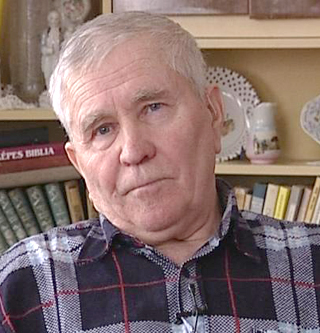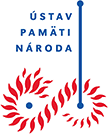Ernest Kyrály (1939)

Biography
“Help and trust each other.”
Ernest Kyrály was born on September 12, 1939, in the village of Zatín where he spent his entire childhood and a portion of his youth. He grew up in the peasant family, so in this respect he experienced the consequences of persecution even in his early childhood. Just because he had an unacceptable origin and sympathized with the peasants who were under his ward when he was in military service, he was investigated and redeployed to the Czech-German border area. There he had to participate in demolitions of houses that had previously belonged to the German population. After coming home he worked as a locksmith in Čierna nad Tisou. Together with his wife they resided in Veľké Kapušany. In 1968 he accepted the offer to make some extra money by carting the building material. He used his own truck. Nevertheless, he was persecuted by members of the National Security Corps (ZNB) and by the local authorities, so he was forced to sell his truck to the collective farm. Later on, he started working as a warehouseman in the gas warehouse in Streda nad Bodrogom where he witnessed the bribery and various frauds. He announced it to the enterprise executives but the result was that he alone was accused of overcharging the gas. Then, he was criminally prosecuted and charged with embezzling and he was also investigated very cruelly. He filed a complaint; however, it was a vain attempt as well as turning for aid to the President Gustáv Husák and to the Central Control Commission. Since the time he became unemployed, he wasn’t able to find any stable job. It meant that the whole family ended up in hopeless situation. He got over that hard period of time just thanks to the support from the side of his family.
Constant Constraints on Peasants
“Those were the days that, let’s say, they came when we were threshing, about fifteen of those grabbers, I didn’t know where they came from and they ordered that firstly we had to meet the given contingent and then we could keep only the leftovers. However, they took everything regardless of what we would sow or what the children would eat. It was not only my dad’s case but almost the half of the village; mainly the prosperous farmers were forced to submit to it, too. It went this way until the year 1953 when the currency reform was carried out. Due to the currency reform in 1953, the system of tickets was abolished and people were able to buy anything without the restrictions; it was much easier then.”
Involuntary Accession to the Collective Farm
“In 1957 the situation became unbearable. At night Július Trošku came to us, he was here a secretary or a chairman, I am not sure, probably the secretary of the Municipal Committee (MNV) and he came and told my father: ‘Mr. Kyrály, you should access to the collective farm, you have stayed alone, or otherwise they will come tomorrow and arrest you.’ And there were another four or five people. He didn’t lie to me; about twenty men came to our house the next day. It was in the morning, so together with my father we went gathering hay because we were supposed to deliver it to the contingent. Well, we went; we loaded the hay with the intention to take it to the nearby village. It was the village of Boľ where we should have brought the hay to. I don’t know; there were seven or eight quintals of it. We had loaded it, came home, we left an ox and axe in front of the gate and went indoors for breakfast, because it was about ten or eleven o’clock in the morning and we even hadn’t had breakfast yet. While we were eating, suddenly twenty or fifteen men appeared at our yard; they came down on my dad immediately, terrorized him, and asked why he refused to access as he stayed the last one. ‘Anyway, you have just a couple of hours,’ they said. ‘Sign it or we will take you.’”
Self-employment as a Reason for Persecution I.
“Once he warned me, he was a member as well, namely it was Ladislav Fuchs. He was a State Security member too, and he called me Ernest, he warned me because he was a good acquaintance of me: ‘Erne, do something, we were said that it’s necessary to get rid of you, that no self-employed is desirable here, we have socialist organizations for distributing the goods. Do something as quickly as possible or otherwise, we will have to confiscate your logbook, so just do something if you can.’”
Self-employment as a Reason for Persecution II.
“Every month I was summoned to the Transport Inspectorate, to the traffic centre or to the District Committee (ONV) and I was also in the Central Office of the Party in Trebišov or in Kráľovský Chlmec at least fifty times and I was interrogated there by the captain Gál and there was always a protocol being written about my hearing. Well, they used to call me a fascist and told me that I took advantage of the weakening of the Communist Party. They asked me why I bought a car, which I didn’t need at all, and ordered me to sell it. And I told the captain: ‘So why did they sell it? I was even at the Transport Inspectorate to ask them if it was possible, if I could have bought it.’ I told him the names of all the people involved. And he responded that back then another law had been in force. However, at that time I was not allowed to have a car. It went this way in years 1972, 1973, 1974, 1975 and I had to travel to Chlmec every week, every month and as I had already said, I was being interrogated by captain Gál and Imrich Szabó, who was another one. He had to be the deputy chief, captain as well, and they talked to me nastily; they treated me like dirt. They called me a fascist, adherent of Dubček’s policy; they blamed me for doing it wrongfully, for abusing people and everything. They went as far as to send me a letter where they had threatened me that if they caught me on the road, my car would have been expropriated in favour of the state and I would have been sentenced to five years of imprisonment, I still have that paper.”
Brutal Investigation
“He summoned me to Streda nad Bodrogom and that young policeman, he was younger than me, he said and tried to convince me to sign that I had two hundred and fourteen crowns or two hundred and sixteen crowns left. He just forced me to sign. I said: ‘You could probably kill me here but I won’t sign what you fancy.’ ‘You won’t?’ ‘No.’ I didn’t want to sign it, so he slapped my face. And as he hit me, I was such a cavalier; I didn’t get scared, I settled an old score immediately, he didn’t even have a chance to dodge. I hit him so strongly that he overturned that hanger where he had a belt, flat cap and clothes as well. As he overturned it, there was another policeman who entered the room and held something in his hand, I didn’t know what, but surely he wasn’t from Streda, he was unfamiliar to me. I felt a burst of pain around my eye. He punched me here on my head and neck. And I went down, I didn’t know how long I had been unconscious and when I came to myself, the room was empty, I was dirty from the dust and the blood was everywhere as they battered me. I clawed my way to the car and couldn’t come around from what had happened. Finally, I was aware that I had to get out from there. So I went to my car like a dog, I crawled on all four to it. Outside, there was a car, so I got in and drove home. Trust me; I had been lying in the bed for eight days. Then, I ... went to Trebišov to say and file a complaint about that policeman. There was one prosecutor, I remember his name was Bajúz, and he spoke Hungarian as well. That prosecutor warned me to stop because I could have had an accident and then I would have maybe kicked the bucket.”
The story and videoclips of this witness were put together and published thanks to the financial support of EU within the programme Europe for Citizens – Active European Remembrance.


Updated at: 11.12.2023
Print Tweet